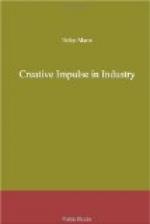The new discoveries in inorganic power and their application to industrial enterprise are possibly more far reaching in their effect on the adjustment and relationships of men than they have been at any other time in the last century and a half. Whatever the world owes to these discoveries and their applications it cannot afford to lose sight of a fact of great social significance, which is, that people have accepted mechanical achievements, not as labor saving devices but as substitutes for human initiative and effort. They have not, indeed, saved labor to the advantage of labor itself, and they have inhibited interest in production. Outside of business enterprise and diplomacy—the political extension of business—mechanical devices have lost the surprise reaction and resentment which they originally set up. As a competitor with human labor they have established themselves as its fit survivor. The prophesy of Theophrastus Such seems to have been already fulfilled, and any new machine added to those already in power in the Parliament of Machines can scarcely add to the worker’s sense of his own impotency. The business valuations which were evolved out of craftsmanship and which were further developed under the influence of the technology of the last century and a half, emphasized the value of material force, and repressed spiritual evaluations, such as the creative impulse in human beings.
Modern industrial institutions are developed by an exclusive cultivation of people’s needs and the desire to possess. They are developed independently, as we have seen, of any need or desire to create. The desire to possess is responsible for the production of a mass of goods unprecedented and inconceivable a century and a half ago. The actual production of all of these goods is unrelated to the motive of men’s participation in their production; the actual production in relation to the motive is an incident. The sole reason for the participation in the productive effort is not the desire for creative experience or the satisfaction of the creative impulse; it is not an interest in supplying the needs of a community or in the enrichment of life; it is to acquire out of the store of goods all that can be acquired for personal possession or consumption. There is no more fundamental need than the need to consume; but for the common run of men as a motive in the creation of wealth, it is shorn of adventure, of imagination and of joy.




